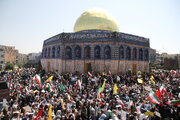The book titled "Revayat-e Aqa" (The Narrative by Aqa) is being published by the Islamic Revolution Publications, affiliated with the office for the preservation and publication of the works of Ayatollah Ali Khamenei.
The book details the life, character, and scientific and spiritual conduct of Ayatollah Seyyed Javad Khamenei, the father of the Leader, as told by his son and student.
Compiled from Ayatollah Khamenei's speeches and writings and approved by him, the 312-page book features previously unreleased documents, including a photograph of Iran’s Leader in 1940 when he was one and a half years old.
The final text has also been reviewed and approved by Ayatollah Khamenei himself.

The book is not a traditional biography but a deep and layered narrative that is intended as a resource for researchers interested in the Khamenei family's legacy.
Rather than being a conventional biography or a collection of personal memories, the work is expected to provide invaluable insights into the Leader's lasting influences and is intended as a resource for researchers interested in the Khamenei family's legacy.
The intended audience for "Revayat-e Aqa" likely includes followers of the Islamic Revolution, scholars, and students of religious and spiritual studies.
The primary focus of "Revayat-e Aqa" is to present a layered and insightful portrayal of a figure whose intellectual and moral influence played a fundamental role in shaping Ayatollah Khamenei’s character.
The book argues that any analysis of the Leader’s approach and behavior would be incomplete without an understanding of his father’s guiding principles.
Earlier on March 29, a Bengali translation of the book titled "Islamic Thought in the Quran" based on the speeches of Leader of the Islamic Revolution Ayatollah Seyyed Ali Khamenei was released in Bangladesh.
The Persian language professor Mohammad Eesa Shahidi, known for his Persian-to-Bengali translations that enhance cultural ties between Tehran and Dhaka, has translated the book.
This book offers a concise and structured overview of Islamic thought as presented in the Quran, covering its fundamental principles, concepts, and central themes.
Brief look at biography of Leader's father

Ayatollah Khamenei's father, born in Najaf on Azar 16, 1274 S.H./Jumadi at-Thani 20, 1313 L.H., and passed away on Tir 14, 1365 S.H., was a respected scholar and mujtahid. He migrated to Tabriz with his family and, after completing Sath level studies, moved to Mashhad in 1336 L.H. There, he studied fiqh and usul under Hajj Agha Hussein Qomi, Mirza Mohammad Aghazade Khorasani (Kafai), Mirza Mahdi Isfahani, and Hajj Fazel Khorasani.
He studied philosophy under Agha Bozorg Hakim Mashhadi and Sheikh Asadollah Yazdi. Later, in 1345 L.H., he went to Najaf, where he learned from Mirza Mohammad Hussein Naeeni, Sayyid AbulHassan Isfahani, and Agha Zia ul-Din Iraqi, who permitted him to practice ijtihad.
He returned to Mashhad and remained there for the rest of his life, teaching and leading public prayers at the Mosque of Siddiqis of Mashhad Market (Azarbaijanis’ Mosque) and the Goharshad Mosque. Known for his deep interest in scholarship, he engaged in discussions and research with peers like Hajj Mirza Hussein Abai, Hajj Sayyid Ali Akbar Khui, and Hajj Mirza Habib Maleki. He lived a pious and ascetic life, indifferent to material possessions.
Even after the Islamic Revolution, despite his children holding high political positions, he maintained his simple lifestyle. Highly regarded for his character, he was buried in a portico behind the Imam Ridha (a.s.) zarih. Imam Khomeini (r.a.) described Ayatollah Sayyid Javad Khamenei as a devout and committed scholar in his condolence message to Ayatollah Khamenei.
Reported by Tohid Mahmoudpour























Your Comment